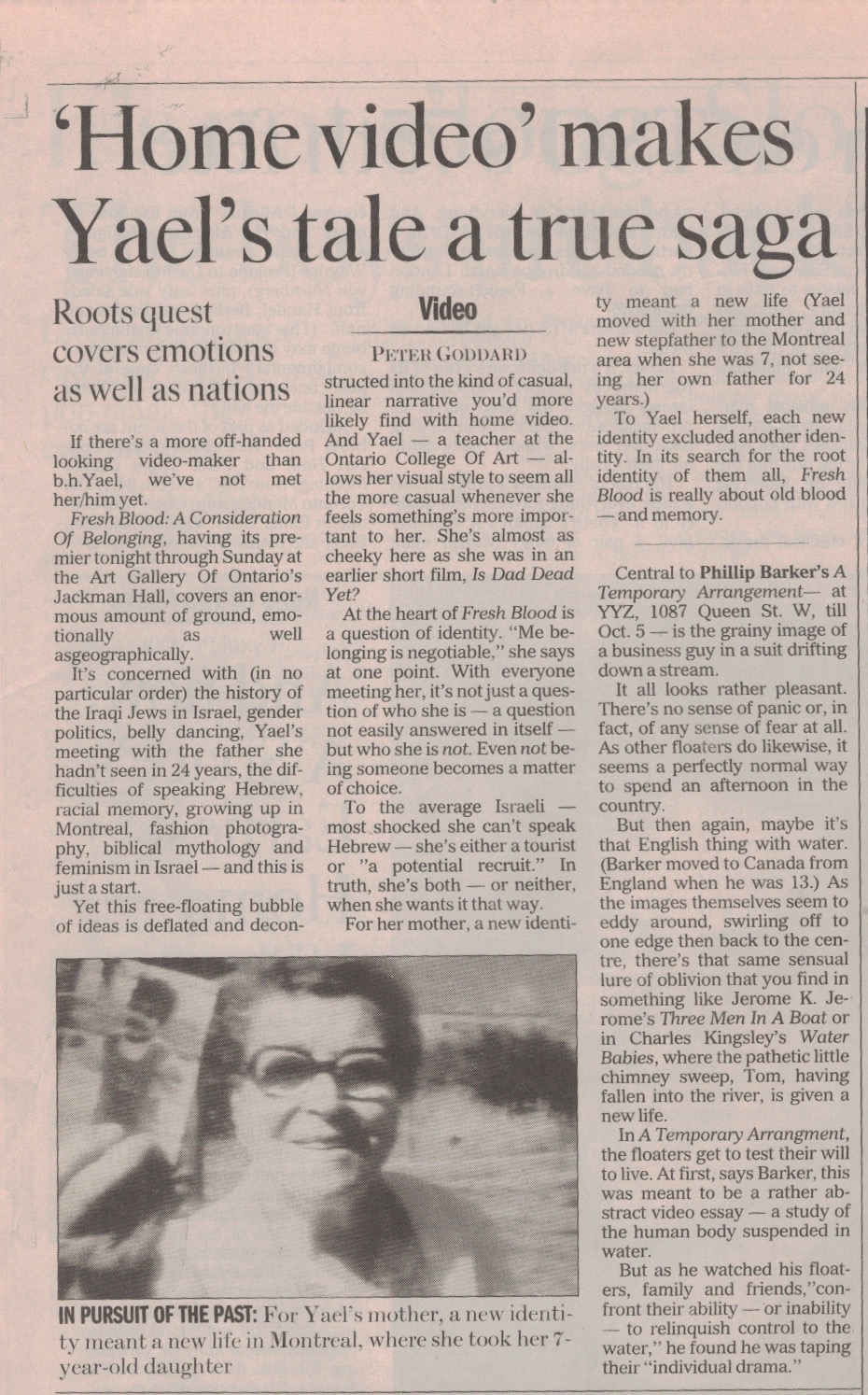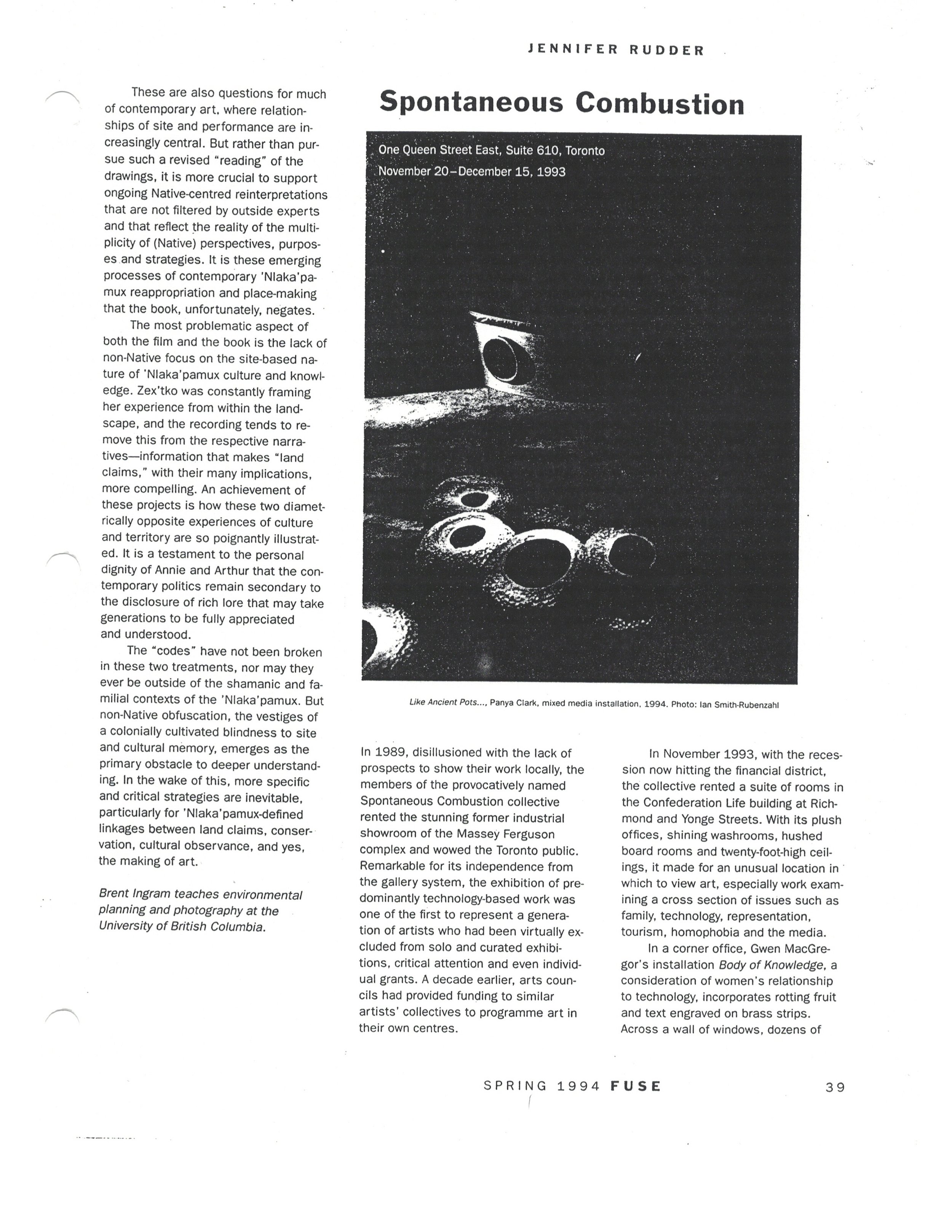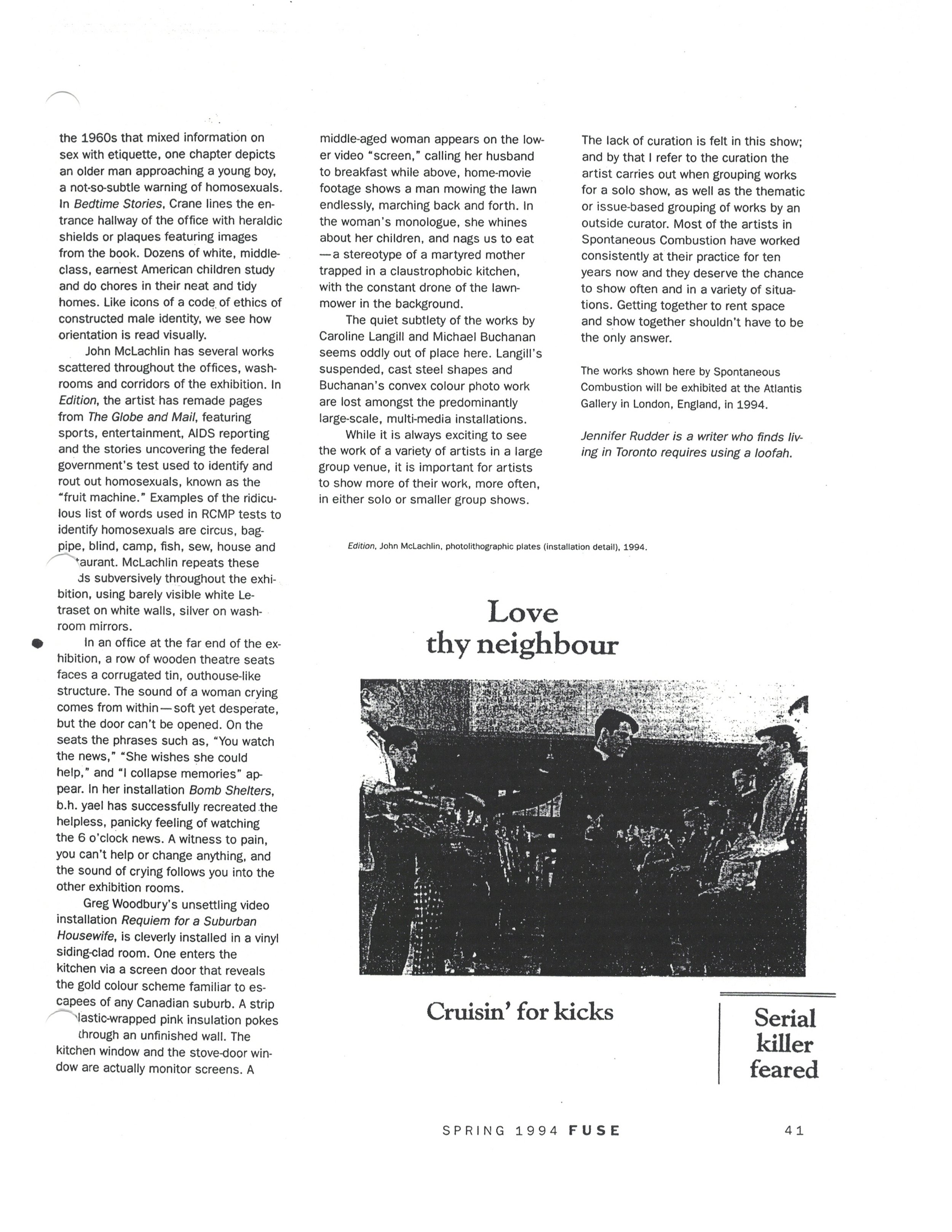B. H. YAEL: FAMILY STATES
Mike Hoolboom (Ed.), 2021
Mike Hoolboom's book is NOW available at Another Story Bookshop!
This 140-page book brings together a collection of writings about the essential work of Canadian media artist b.h. Yael addressing issues of power and belonging, Palestine and remembering, gender roles and activism. The ideas and locations featured in Yael's films and videos reverberate through these responsive texts by fellow artists, filmmakers, writers, teachers, and activists, providing new and startling perspectives. The book also includes an interview conducted by editor Mike Hoolboom and pictures galore.
More about the book, the speakers, the films, the artists and writers' bios
Writers include: Cameron Bailey, Yann Beauvais, Niko Block, Dennis Day, Brian Dedora, Clint Enns, Richard Fung, Rebecca Garrett, Amy Gottlieb, John Greyson, Nadia Habib, Johanna Householder, Dalia Kandiyoti, Ali Kazimi, Caroline Seck Langill, Deirdre Logue, Robert Massoud, Judy Rebick, Steve Reinke, Deborah Root, Kerri Sakamoto, Lia Tarachansky.
Published by ConverSalon. Funded by the Ontario Arts Council.
Geopolitics & The Videos of b.h.Yael
by Richard Fung
Fierce: Women's Hot Blooded Film and Video, Mar. 10, 2010, pp. 36-37
Hamilton: McMaster Museum of Art, 2010
Richard Fung discusses the video work of b.h.Yael in Fierce: Women's Hot Blooded Film/ Video, which "denaturalizes boundaries and borders by excavating their origins in power, interrogating their philosophical underpinnings, probing their role in human and natural devastation, and dying the mistrust and sometimes violence engendered in their creation. Each video has a focus, (apocalyptic culture, Israel/Palestine conflict, the Summit of the Americas), but each are linked by a "profound engagement with the land". In a moralistic tone, Fung ends the article in saying each video impresses upon the viewer to appreciate the materiality of the land, beyond real estate or territory.






Corporeal Pedagogy and Contemporary Video Art
by Stephanie Springgay
Art Education, Mar. 2008, v. 61, no. 2, pp. 18-24
The author examines the phenomenon of the video essay as a genre which rests somewhere between documentary and video art, as well as its inherent self-reflexivity, which makes it a more social, political and pedagogical medium.
Keywords: memory, narration, visual culture, Palestine.







Jewish Tribune, Apr. 11, 2008
A short article on B.H. Yael's Trading the Future which ran at the 21st Image Festival. The Israeli born - Toronto based video artist investigates in her new work the relationship between God and environmental issues. The film draws parallels between the religious and the secular regarding issues of death, human comodification and politics. Ultimately, the film questions how one should and could have a quality relationship with the environment.
Lollipops and the Future: Two feature films at Images look to lure...
by Jessica Padykula
Video Essay questions religious apocalypse
by Barbara Shainbaum
SceneandHeard.ca, Apr. 7, 2008, v. 8, no. 2, p. 1
Two reviews from Sceneandheard.ca which take a look at movies (The Lollipop Generation and Trading the Future) that involve the topic of apocalypse. Both films were featured in the 21st annual Images festival and are made by Canadian film makers.
The first part of the article discusses the film, 'The Lollipop Generation' by G.B. Jones and is described as being a "rollercoaster of a road trip" as it follows a young girl running away from home.
The second part of the article reviews B.H. Yael's film, 'Trading the Future' which describes her upbringing, proposes questions regarding a supposed 'rapture' within our society, and how these have shaped the world we live in.
Fresh Blood: A Consideration of Belonging.
Review by Sandra Haar
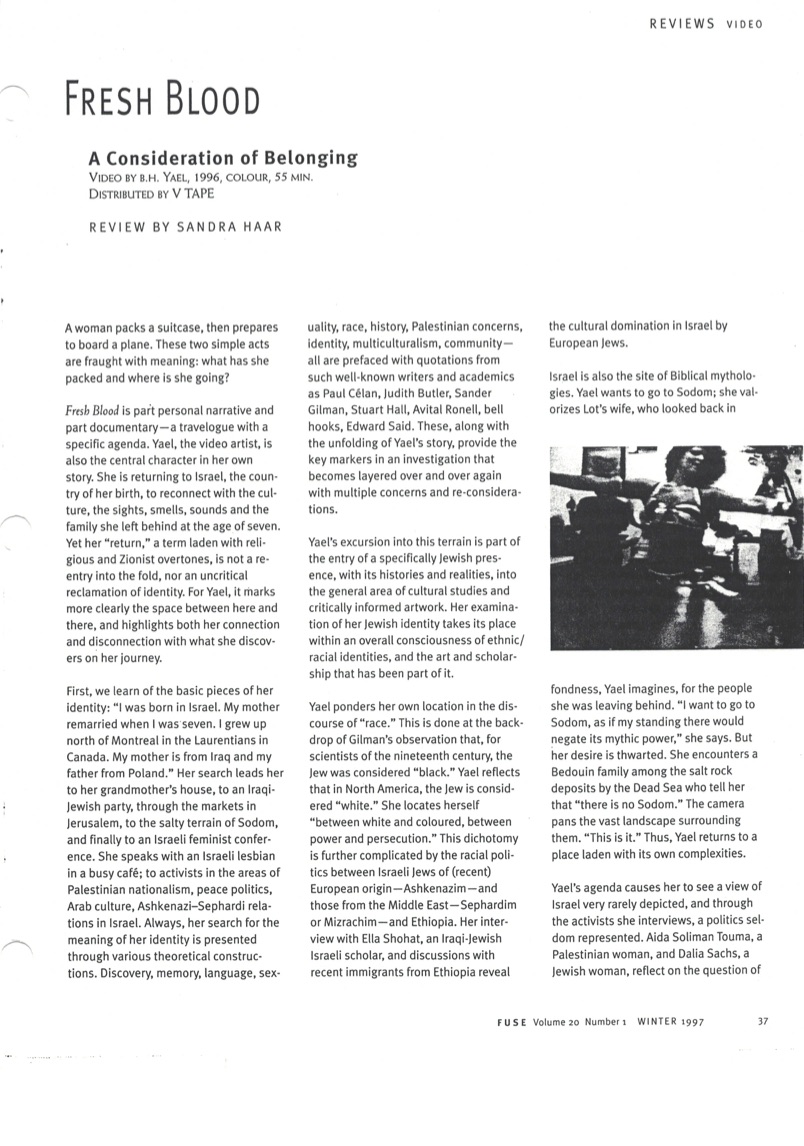
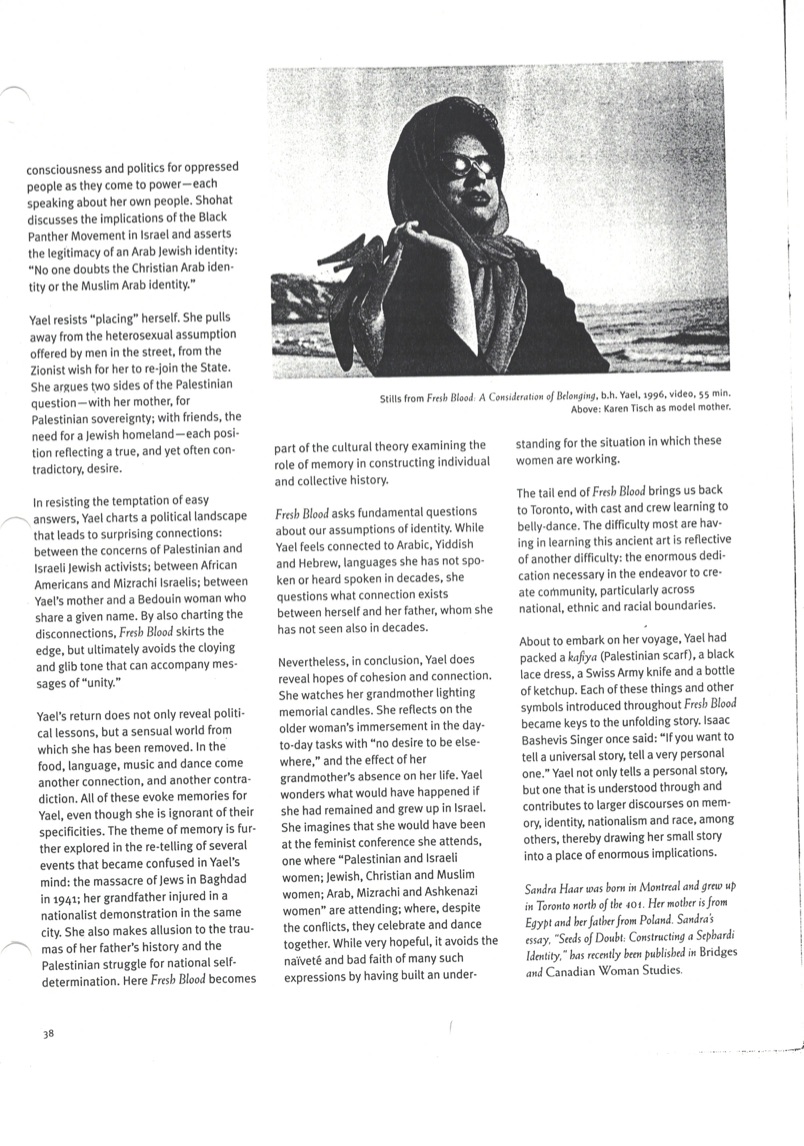
This feminist film is drop-dead funny
by Craig MacInnis
The Toronto Star, Jan. 15, 1991
A review of the film Is Dad Dead Yet by b.h. Yael. The article also touches on tendencies in feminist humour.
Ardent Spaces, Formidable Environments
by Patricia R. Zimmerman
Fierce: Women's Hot Blooded Film/Video, Mar. 2010, pp. 40-47
Hamilton: McMaster Museum of Art, 2010
Patricia Zimmerman writes an artful review of Fierce: Women's Hot Blooded Film/Video, featuring Dana Claxton, Maureen Bradley, Allyson Mitchell, and b.h.Yael. Zimmerman identifies a commonality binding the artists work in this cohesive exhibition, extending beyond gender. Coming from the legacy of feminist media practices, yet moving beyond identity politics in to media work that is more relational, the exhibition successfully creates flexible environments across genres. Common threads running through the exhibition are 'poly phonics" (music), topics of micro-territories (queer identity, childhood memory, Israel/Palestine conflict), and "ardent space" (converting a linear forward drive of the temporal in to an open horizontal space). "In Fierce, media work blends discourses, practices, and spectators, enfolding the polarizations, oppositions, and contradictions of earlier feminist works".




"Imperfect Homecomings": Exile, Feminist Video and the Lure of the Maternal
by Marilyn Burgess

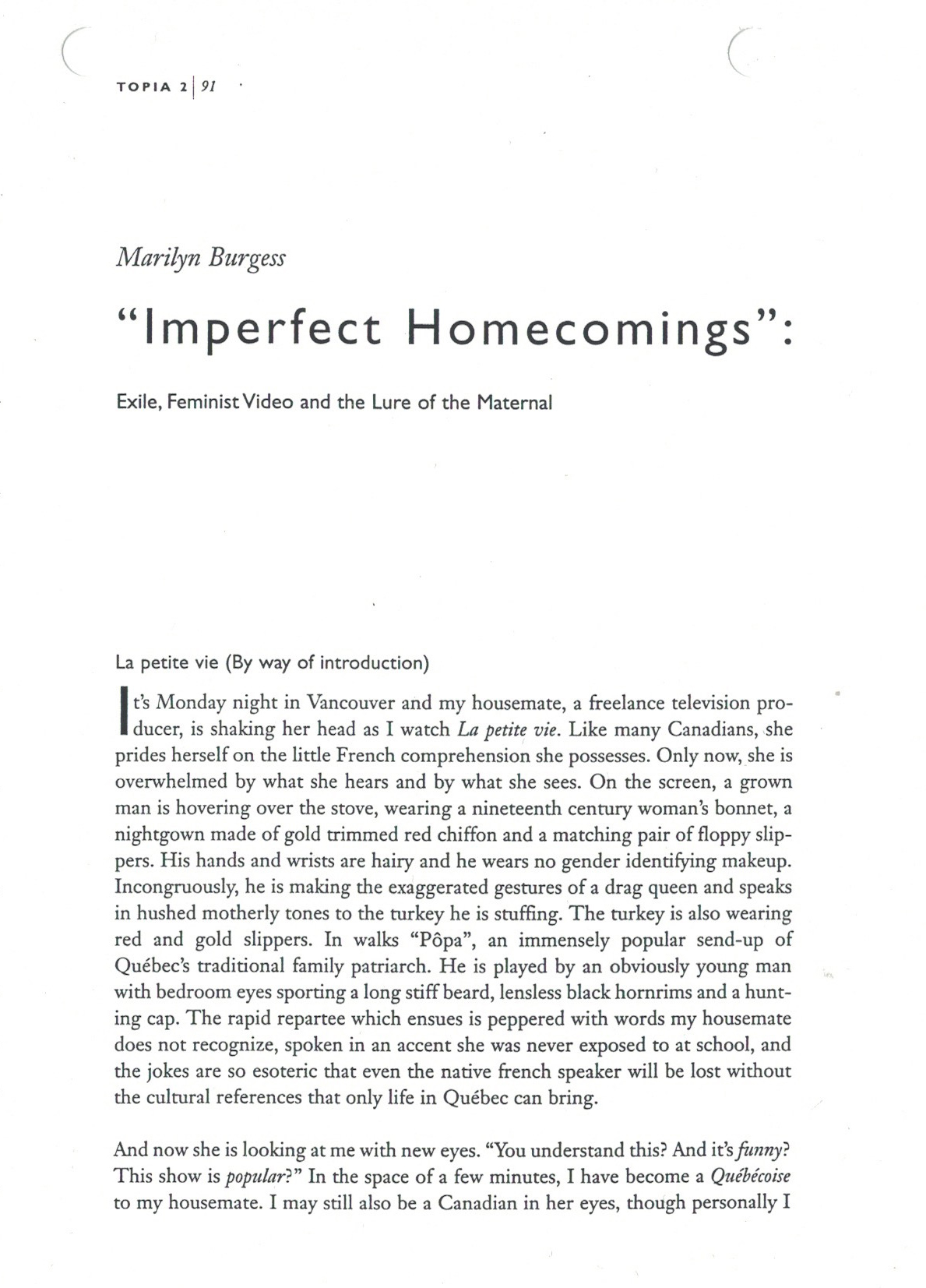




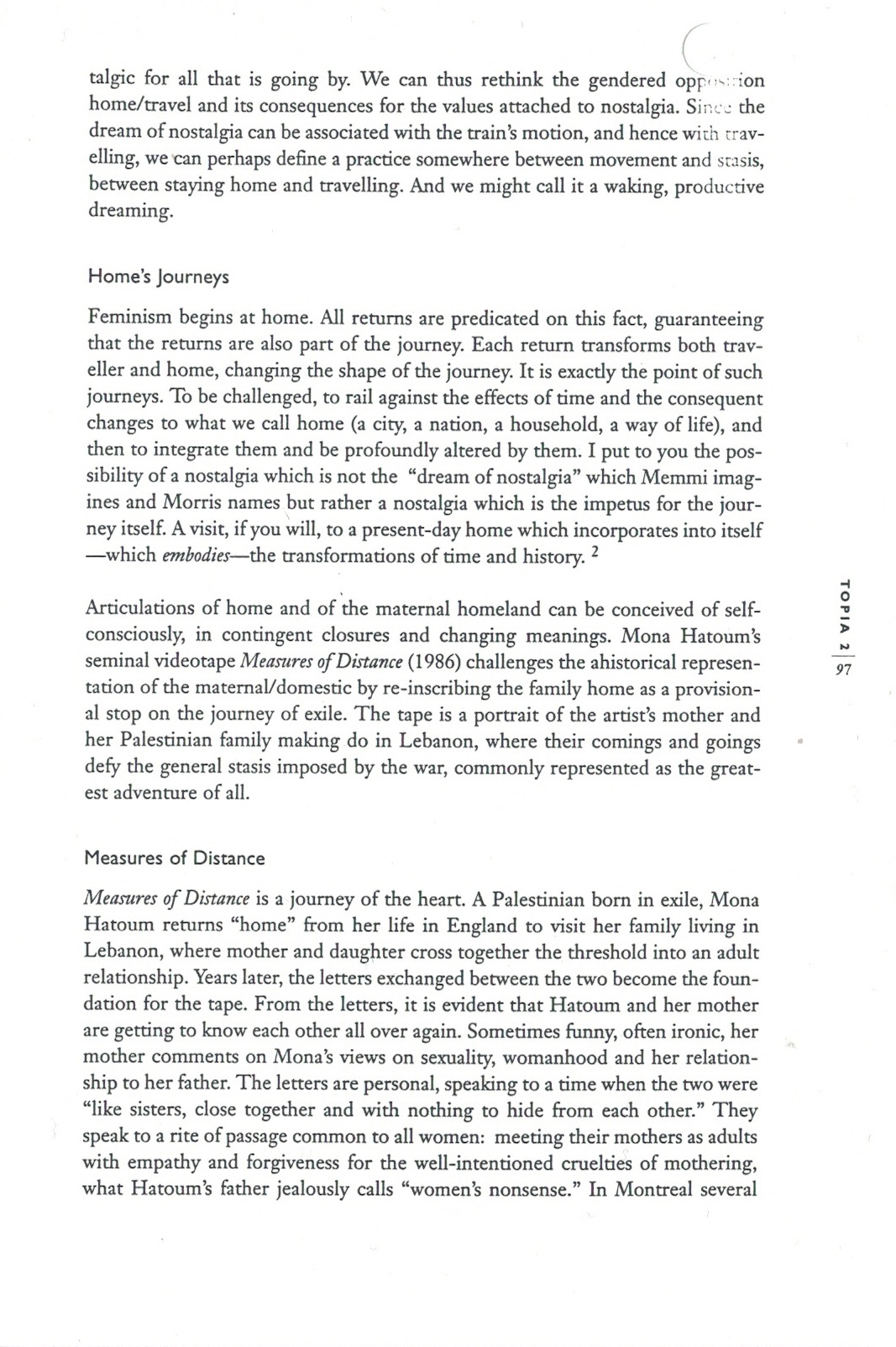
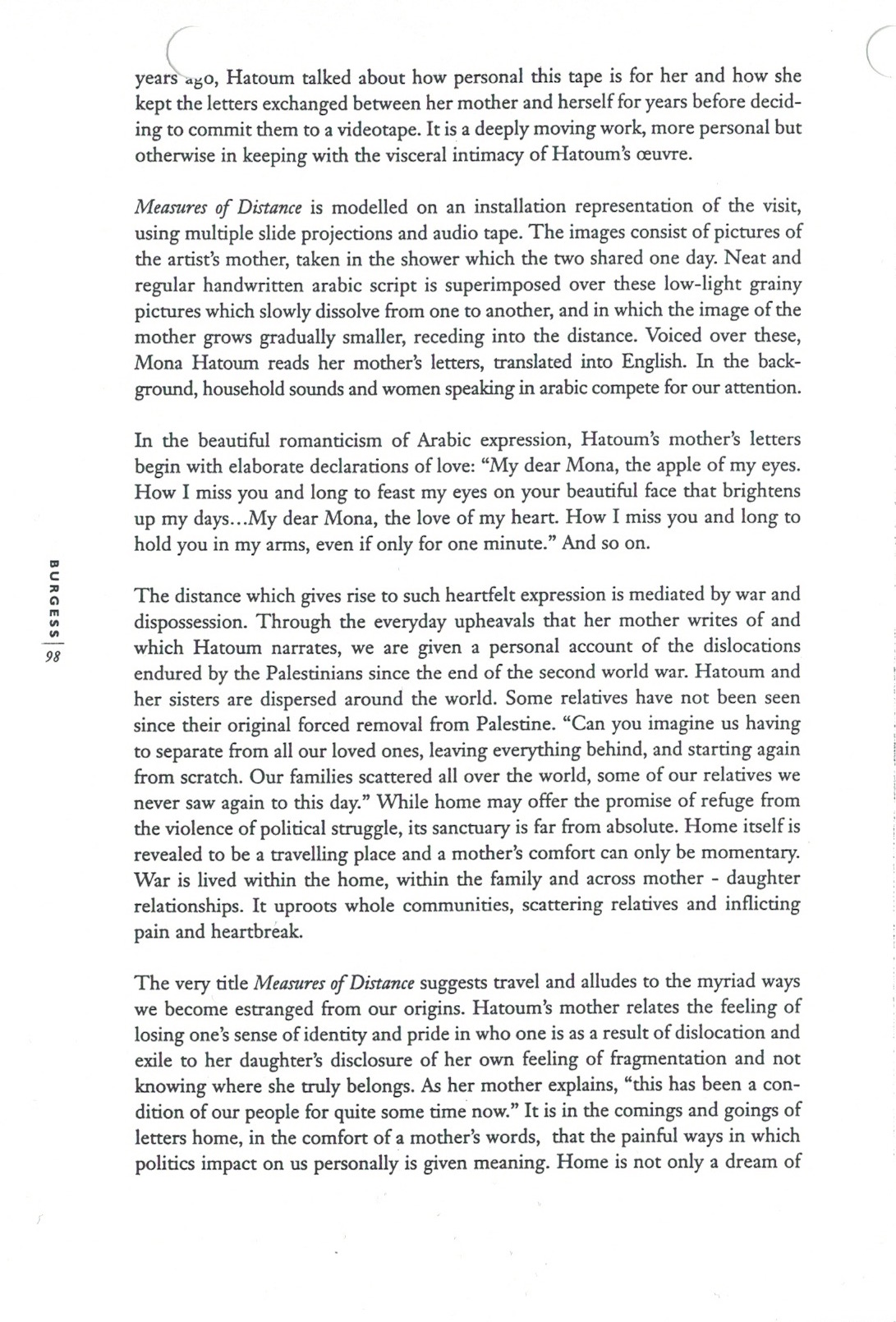
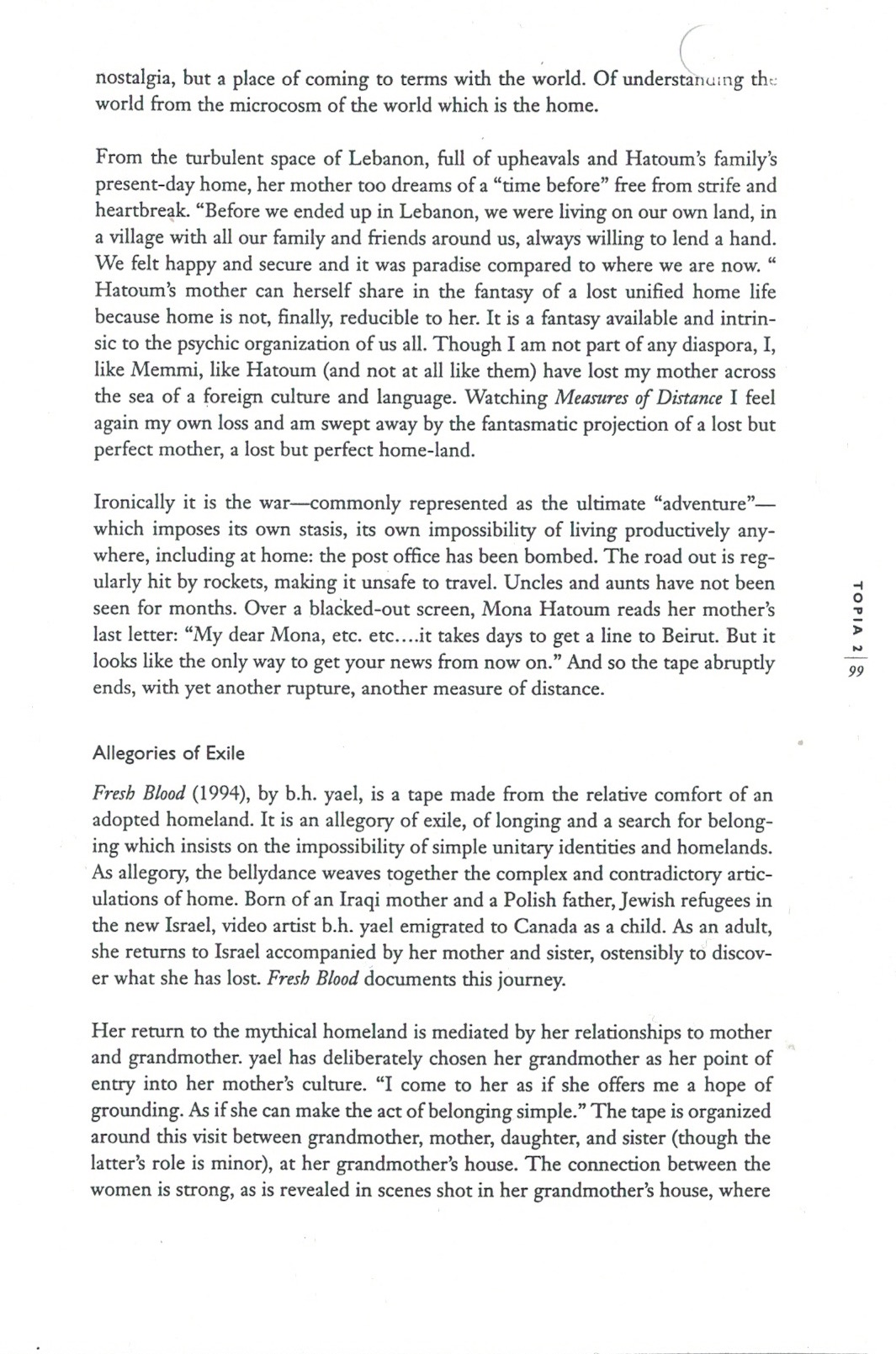



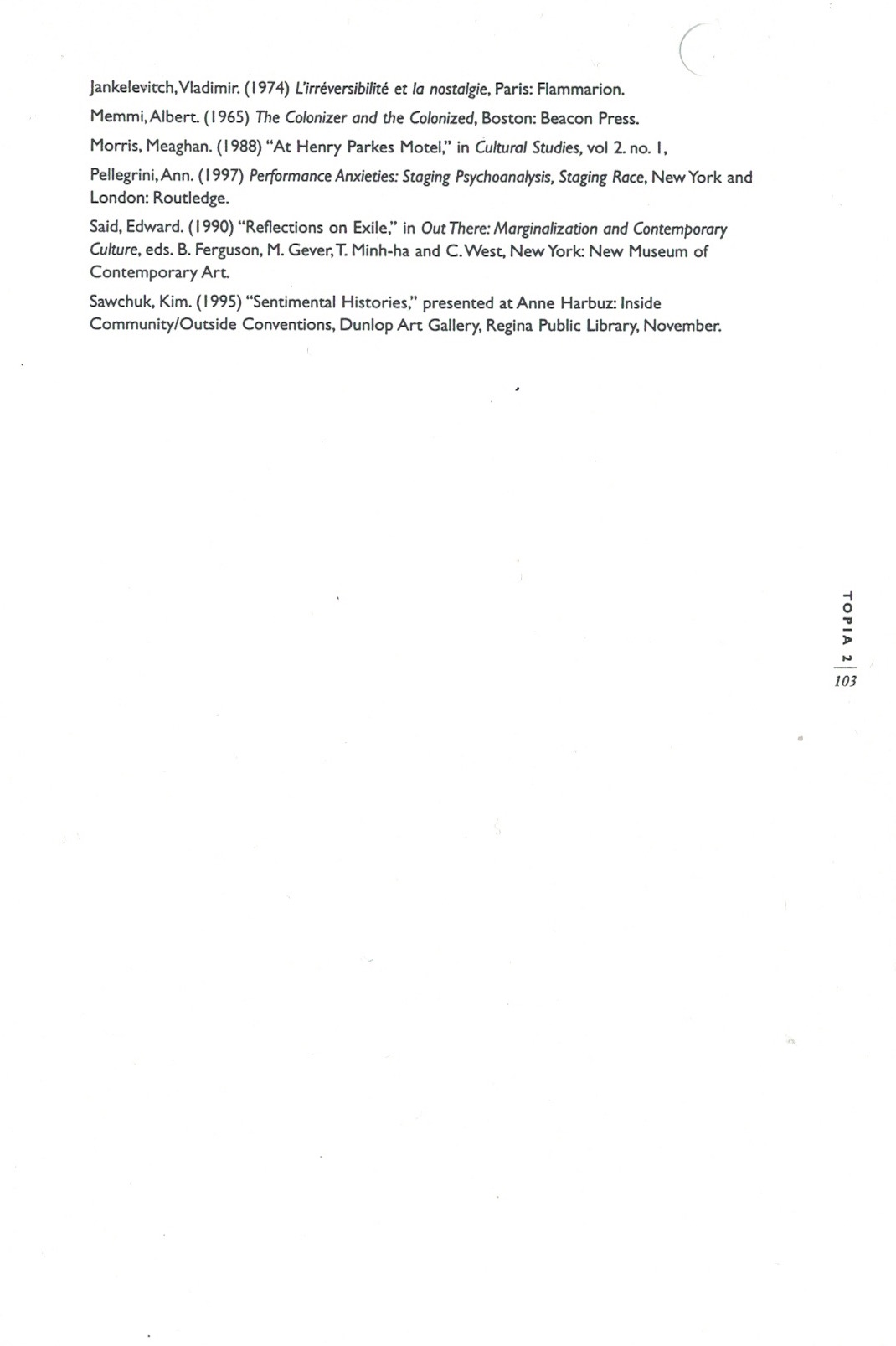
The National Post, Mar. 29, 2008
An online National Post article runs down the top five not to be missed cultural events of the week. Listed at number two is the 21st Images Festival which is described as an unparalleled celebration of short filmmakers, video artists and all sorts of celluloid experimenters. Artists featured at this year's festival include; Nelson Henricks, Charles Atlas, Barbara Sternberg and b.h. Yael.
Must do: if you only do five things this week
by National Post
Strategic Approximation: Independent Videographers Revise the...
by Janice Hladki
Feminist Media Studies Journal, Mar. 2008, v. 6, no. 1, p. 19
In Janice Hladki's article, Strategic Approximation, she puts into review two collaborative videographic works by Toronto based Female artists: B.H. Yael and Johanna Householder. The works described by Hladki are re-creation's of two, infamous, Hollywood films (Apocalypse Now and 2001 Space Odyssey). Hladki goes on to describe the two feminist artists works, which she claims "provoke and trouble the social, spatial, political, and identity narratives of the scenes in said classic movies."
The review also details the approaches each artist made in their collaborative efforts and describes the technical aspects each artists specialize in, as well as their intentions in remaking the scenes from each film.
Sketch Magazine, 2006


Half Empty, Feb. 2005, no. 3, p. 36
This article offers a description of Vtape's Curatorial Incubator program, particularly its second one. A brief survey and synopsis for each of the six videos are written.
The Curatorial Incubator, Round 2
by Marty Spellerberg
Now, Sept. 19, 1996, v. 16, no. 3, p. 91
b.h. Yael talks in depth about her video Fresh Blood in which she journeys with her mother and sister, seeking out the meaning of female and family identities. yael addresses how the piece fits into her larger body of work, many of its conceptual underpinnings, and the shooting process.
Video artist reconstructs shifting Jewish identity: Fresh Blood...
by Cameron Bailey
The Toronto Star, Sept. 19, 1996
Goddard's article focuses on the identity politics at the heart of b.h Yael's Fresh Blood.
Home video makes Yael's tale a true saga: Roots quest covers...
by Peter Goddard
Spontaneous Combustion
by Jennifer Rudder
Fuse Magazine, 1994
Now Magazine, Dec 9, 1993
Spontaneous Combustion: Barbara Balfour, Michael Buchanan, Panya Clark, Bill Crane, Caroline Langill, Francis LeBouthillier, Gwen MacGregor, John McLachlin, Tony Tavares, Greg Woodbury and B.H. Yael.
Spontaneous Combustion filling up empty office space
by Deirdre Hanna
Combustion stokes artistic fires
by Donna Lypchuk
Metropolis, Nov 9, 1989
Xtra!, Dec. 5, 1996, no. 316, p. 35
With East of Here, 42 artists wrestle with Western perceptions of colonialism and post-colonial Arab identity through installations, video, film, photography and text.
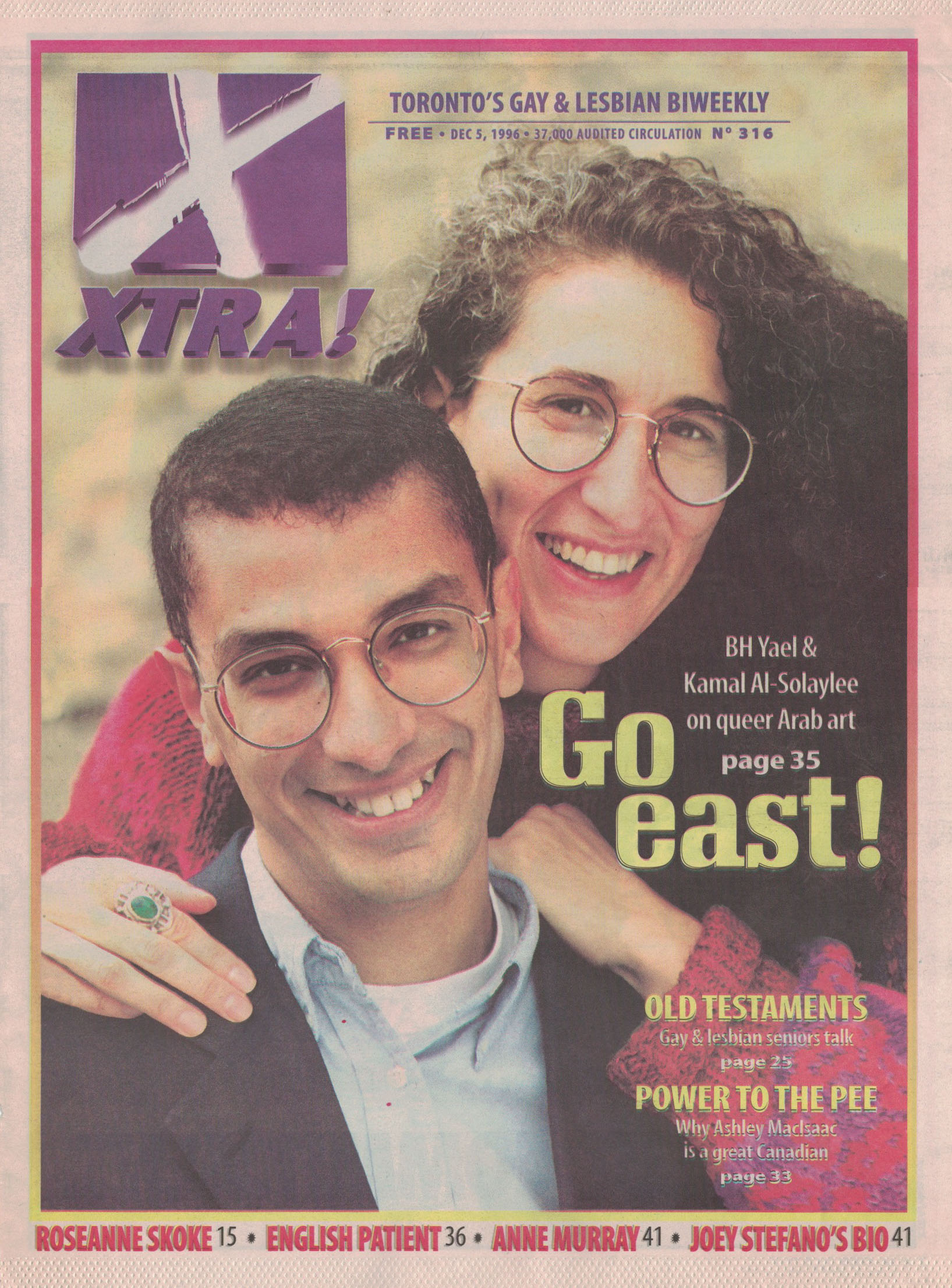
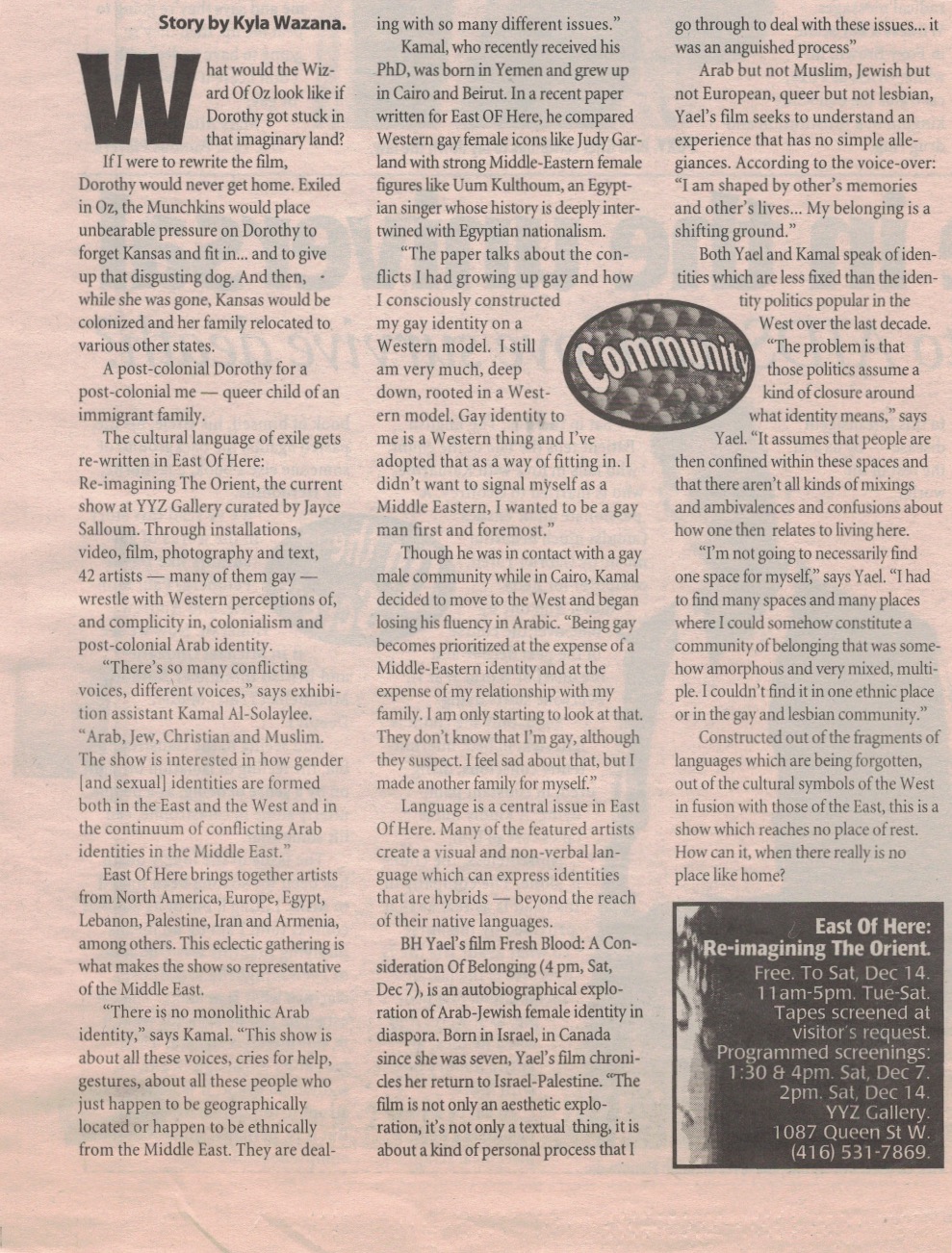
Screen, Summer 1993, v. 34, no. 2, pp. 109-123
This article explores mother-daughter relationships in various video works. A voluminous body of women's narratives, in this instance considered from within feminist video production, have given voice over the past two decades to the story of daughters uncomfortably bound to the psychic, symbolic, and historical legacy of mothers.
Desiring Daughters
by Renee Baert

